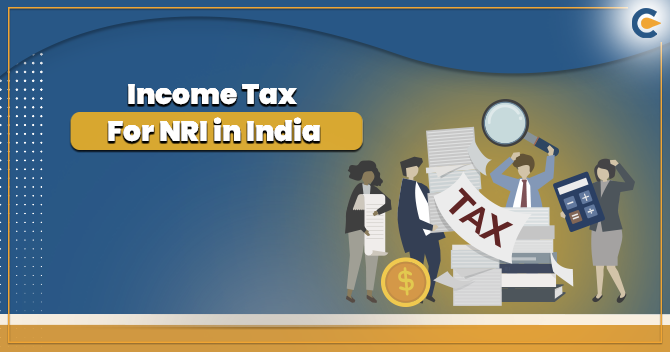The Indian economy moves with the help of tax. The tax collected from the citizen is used to build roads, hospitals, school and to provide other amenities to the general public. It is the core foundation of the Indian economy eventually. The tax collected from resident or non- resident it doesn’t make any difference to its end-use. Today, in this article we will throw some light on the Income-tax for NRI. To know about Income tax for NRI first we need to check the residential status of the person whether it comes in resident or non- resident.
How to Check the Residential Status?
In end of the financial year (FY), the term NRI involved the persons who stayed within India’s territory for 182 days (or less) in any financial year. In March 2020, the Government of India introduced certain amendments.
If you are an NRI visiting India, your residency status will change by fulfilling the below-mentioned criteria.
- If the person’s total Indian income is more than INR 15 lakhs during a financial year and stays for more than 120 days in the same financial year.
- An NRI is considered a resident of India if they are an Indian citizen whose total income (other than foreign sources) is more than INR 15 lakhs. They are not liable to pay tax in any other country.
Let’s understand the concept of the Resident But Not Ordinarily Resident (RNOR) Status.
A person has visited India frequently in the first four years of the current financial year of your recent visit. If the total number of days is 365 (more than four years), he will be treated as a resident Indian for income tax purposes. The residency status of that person will then become a resident but not a resident (RNOR).
What Incomes are Included in the NRI’s Income?
Once the person has proved his residential status, he is required to calculate his taxable income. If his total gross income is more than INR 2.5 lakh in a financial year, he will be liable to pay tax.
The below discussed are the categories of taxable income
- Income earned from salary or professional consultation.
- Income earned from house property (a standard deduction of 30% applies).
- Income earned from doing business in India.
- Income earned from other sources like Interest on NRO Deposits, dividends or gifts.
- Income earned from capital gains arising out of the sale of assets.
Also, Read: How to Calculate Income Tax For Salaried Individual
Are NRI required to File Income Tax Return?
Yes,
Resident or non- Resident of India, any individual whose income exceeds Rs 2,
50,000 required to file its income tax return in India.
The last date to file an Income tax return in India is 31st July for Non-
Resident of India. In case, the tax liability exceeds Rs 10,000 in a financial
year then the person is required to pay the advance tax. Furthermore, the
interest under section 234B and section 234C is applicable when the person
doesn’t pay the advance tax. File your Income-tax return now!
What is Taxable Income for an NRI?
The taxable income is income that a person earned by the way of salary, profit or other income. The salary you receive in Indian or by any other person on your behalf is taxable in India. Therefore, in the case of NRIs, the person receives the salary directly into an India account then it will be subject to Indian tax laws. The Income-tax is taxed according to the slab rate the person belongs to.
Income Earned From Salary
The income earned from salary is considered as taxable if the services are rendered in India. So, in case you are an NRI and your salary is paid towards the service provided by you in India then it shall be taxed in India irrespective of the factor where you are getting the income.
Furthermore, in case your employer is Government of India and the person is a citizen of India rendering service outside India is also taxed in India. The income of Diplomats and ambassadors are exempted from tax.
For example- Mr. Rohan was working in Canada on a project from an Indian company for a period of 5 years. Rohan needed the salary in India to take care of the needs of his family and make payments towards a housing loan. However, since salary received by Rohan in India would have been taxed according to the Indian laws but rohan decided to receive it in china.
Income from House Property
Income earned from a house property situated in India comes under the category of income tax for NRI. The calculation of the income shall be in the same manner as it for the resident. The property could be rented or lying vacant. An NRI is allowed to claim the deduction of 30%, or can deduct property taxes and can also avail the benefits of an interest deduction if there is a loan taken for home. The Non-Resident of India has also allowed having a deduction for the principal repayment under section 80C.
In addition to that, any stamp duty and registration charges paid at the time of purchase of a property can also be claimed under section 80C. Income from house property is taxed according to the income tax slab rates.
Let’s understand this with an example-
Sunita own house property in Chandigarh and has rented it out the property while she lives in Thailand. She has directed the tenant to make rent payments to be received directly in her bank account in Bangkok. Sunita’s income from this house which is in India shall be taxable in India.
Rent payments to NRI
A tenant
that lives in NRIs house and paid rent to the NRIs owner shall remember to
deduct TDS at 30%. The Income can be transferred to Indian account or the NRIs
account where he is currently residing. This rental income of NRI raises the
liability of Income-tax for NRI.
For example- jiya pays a monthly rent of Rs 30,000 to her NRI landlord. She is
obliged to deduct tax at 30% for TDS or Rs 9000 before transferring the money
to the landlord’s account. Jiya must also get a form 15CA prepared and timely
submit to the Income-tax department online. Any person making remittance to a
Non- resident India needs to submit Form 15CA online that is duly certified by
the Chartered accountant detailing the exact payment, DTAA if applicable, TDS
Rate and TDS deduction as per the Income act under section 195[1].
When Form 15CA is not required-
- Remittance doesn’t exceed Rs 50,000 in a single transaction and Rs 2, 50,000 in a total financial year. In that case, only Form 15 CA is required to be submitted.
- If lower TDS is deducted and a certificate is received under section 197 for it lower TDS
- If the transaction falls under the Rule 37BB of the Income-tax act, where the item is listed in 28 parts.
- Income From Other Source -The next income that comes here is the income from other source. Any interest income received from fixed deposit and saving accounts held in Indian account is taxable in India. Interest on NRO account is completely taxable.
- Income From Business and Profession – Any business or profession who is owned or controlled or set up by the NRI is owned to pay the Income-tax. The NRI is liable to pay the Income-tax.
- Income Earned From Capital Gain – Any capital gain earned at the time of transfer of capital asset situated in India shall be taxable in India. Capital gains earned from any investments in India through investing in shares, securities shall also be taxable in India. If a person sold the house property and have a long-term capital gain, then, in that case, the buyer shall deduct TDS at 20%. However, a person who sold the property is allowed to claim capital gains exemption by investing in a house property as per Section 54 or investing in capital gain bonds as per Section 54EC.
What are The Special Provisions Related to Investment Income?
Whenever the NRI invests in any kind of Indian assets then he is taxed at 20%. If the special investment income is the only source of income then the income earned by the NI during the financial year, where TDS has been deducted then such NRIs are not required to file an income tax return.
What are The Special Investment Vehicles That Qualify the Special Treatment?
The following are the special investment vehicles that are derived from the following Indian assets acquired in foreign currency:
- Shares in a public or private Indian company
- Debentures issued by a publicly-listed Indian company (not private)
- Deposits with banks and public companies
- Any security of the central government
- Other assets of the central government as specified for this purpose in the official gazette
There is no deduction allowed under section 80 while calculating investment income.
Special Provision Related to Long-Term Capital Gains
The long-term capital gains made from selling or transfer of the foreign assets then under Section 80 there is no advantage of indexation and deductions are not allowed. But under Section 115 F exemption on the profit can be availed when the profit is again reinvested back in to:
- Indian company shares
- Indian public company debentures
- Bank Deposits and Indian public companies
- Securities of Central Government
- Issue VI and VII of NSC
In the given above case, if the new asset cost is less than net consideration then the capital gains are exempted proportionately. The above benefit may be obtainable to the NRI even when they become a resident and until those asset is converted to money. Also they can obtain the benefit on submitting a declaration for the special provision application to the Assessing officer.
Conclusion
Any person or Non- resident of India can file the Income-tax return by accessing the official site of the Income tax department or let us help you in that. We at corpbiz have the finest track record of filing the tax liability for resident and non- resident of India.
Read our article:Income From Other Sources- Do You Also Have?











